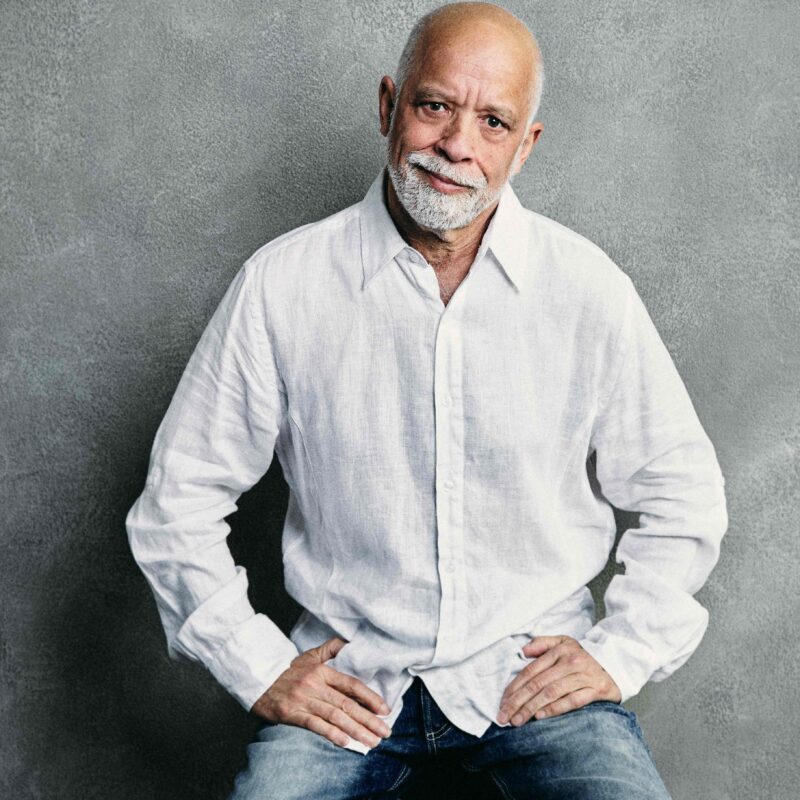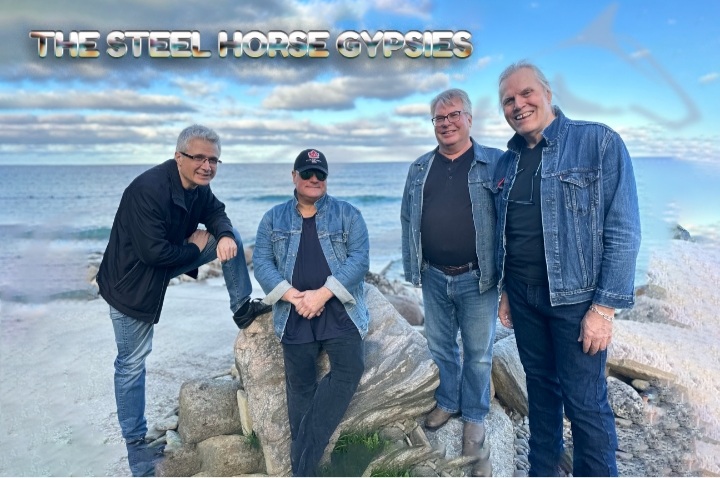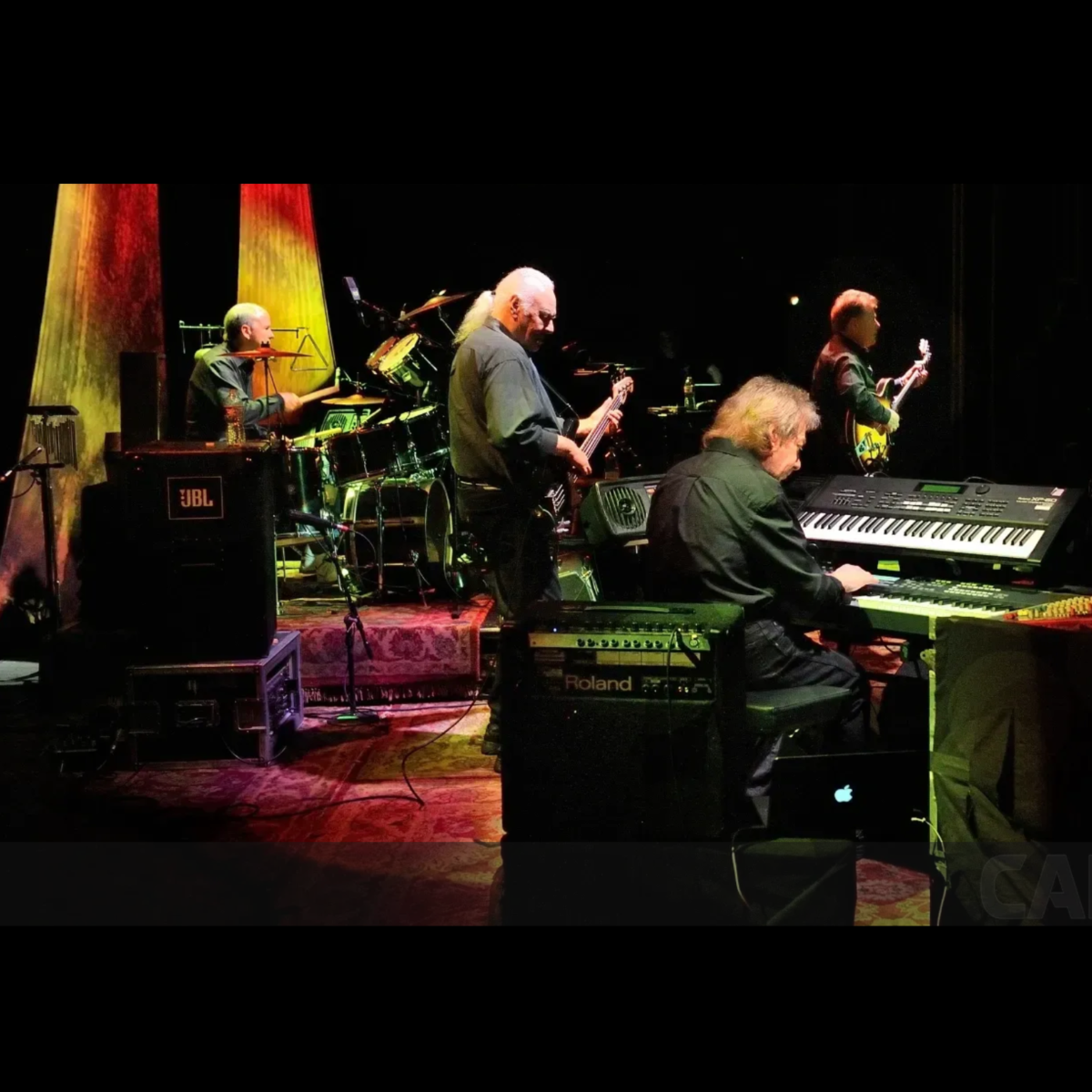In the prologue to Myles Goodwyn’s newly released autobiography, `Just Between You And Me” (Harper Collins), the April Wine lead vocalist/guitarist describes the near death experience he endured November 28th 2008 while en route from Montreal to Halifax where the band was due to be feted by radio station Q-104
How he bailed out of the car being driven by band guitarist Brian Greenway and collapsed by the side of the road. Rushed to one hospital and then transferred to Montreal General when he was diagnosed as suffering from acute alcoholic poisoning which had resulted in major internal bleeding from the esophagus. Had Goodwyn not received such immediate attention, the results would have been fatal.
“When I came home from hospital, I remember looking at myself in the mirror and not recognizing the person looking back,” Goodwyn notes in his book. “Would I ever see the Myles Goodwyn who had existed only a few months before or was it too late?”
Goodwyn answers that question himself, when he’s on the phone, plugging his book (a great Christmas gift!) while taking a break from recording his latest project; ‘Myles Goodwyn & Friends Of The Blues’, as implied, a blues album recorded with the cream of contemporary blues players including David Wilcox, Amos Garrett, Jack De Keyser, Frank Marino, Kenny “Blues Boss” Wayne and Rick Derringer
Drug and alcohol free, active with his own Myles Goodwyn Band as well as continuing to perform a reduced schedule of dates with April Wine, Goodwyn felt the time was right to document the rise, fall and rise again of a band that from it’s modest beginnings in Waverley Nova Scotia in January 1970. How the band, capitalized on a 70’s boom in Canadian music, triggered by a CRTC ruling which stated that every Canadian radio station must play at least 30% Canadian content, to becoming Canadian music icons who were honored by their 2010 induction into The Canadian Hall of Fame.
Along the way, April Wine recorded 16 studio albums, enjoyed the infamy of co-starring with The Rolling Stones March 4th 1977 at Toronto’s El Mocambo Tavern, achieved their first double platinum album with the 1975 `Stand Back’ release, triggered major global success with Capitol Records, commencing with their 1978 `First Glance’ release, appeared at the first Monsters of Rock Festival in at England’s Castle Donnington site in 1980 (along with the likes of Rainbow, Judas Priest and The Scorpions) while having to adjust to numerous personnel changes.
Goodwyn himself admits, penning his book was a cathartic experience, allowing him to revisit the past, address issues with regards to certain band members, come to terms with his own personal demons while at the same time emerge as a survivor, one who is still active with a number of current projects on the go.
“When I revisted the past, I found myself thinking, `why did I react in a certain way’ what was my thought process at that time,” Goodwyn explained. “I appreciate the good things the band achieved but now, looking back, I do see things in a different light and it was good for me to go back, reflect and understand myself better by writing this book.”
 “Just Between You And Me” also describes Miles Goodwin’s formative years (yes the y’s came later), losing his mother, Roberta Anne, to a brain tumour before his 11th birthday, struggling with his two brothers to be brought up by his father, who suffered chronic depression at the loss of his wife, and an understanding Grandmother `Nan’ who took responsibilty for his upbringing.
“Just Between You And Me” also describes Miles Goodwin’s formative years (yes the y’s came later), losing his mother, Roberta Anne, to a brain tumour before his 11th birthday, struggling with his two brothers to be brought up by his father, who suffered chronic depression at the loss of his wife, and an understanding Grandmother `Nan’ who took responsibilty for his upbringing.
Anecdotes of a young Myles, finding an escape in hunting rabbits and fishing before discovering a love of music and an aptitude to play guitar. A teenage Myles who ocassional ‘lifted a car’ to facilitate his travels home to Waverley from the nightclubs of downtown Halifax and was known to execute the odd break and entry.
And then, after playing in a series of dead-end cover bands, Goodwyn hooked up with a former neighbour, Jim Henman and his two cousins, David and Ritchie Henman to form April Wine, taking a vow only to play original material.
A classic misunderstanding led the neophyte band pulling up anchor in Halifax and heading west to Montreal. They had receive a polite rejection letter from rock impressario Donald K Donald (Donald Tarelton) on a demo tape the band had submitted to him, but misreading the note, they actually thought he was asking for more demos, so they pile into a van and decided to record the next demos in person.
Shocked at the arrival of these miscreants but also impressed by their chutzpah and a positive crowd reaction to their early gigs, Tarelton assigned them to his fledgling Aquarius Records and had them sign an in-house management contract with Terry Flood. When noted music publisher, Brian Chater, signed the band to his Summerlea Music company and April Wine was off and running, recording, their self titled debut which produced one hit single “Fast Train”
No lead singer had been designated, with three singer-song writers existing, but when “Fast Train” became a strong regional hit, Goodwyn emerged as the front man.
By the time, producer Ralph Murphy was drafted in to record the band’s second release, the 1972 `On Record’ which featured two major hits; covers of Hot Chocolate’s “Could Have Been A Lady” and Elton John’s “Bad Side Of The Moon”, Goodwyn was in charge of the vocals but the band became increasingly frustrated with their Canadian label and management.
“We had a hit single in the States with “Could Have Been A Lady” but there we were playing some dive bars in Canada when we should have been playing in the States,” fumed Goodwyn. “Even if we had been playing in a bar in Philadelphia, it would have helped the record but our Canadian management had no idea how to break us in the States.”
Then the original lineup started to disintegrate. First Jim Henman started to feel the pressures of touring and felt conflicted with his religious upbringing so he left after On Record to be replaced by Jim Clench. Then Ritchie and David Henman bailed during the recording of 1973’s`Electric Jewels’ pushing Goodwyn to reform the band with Clench on bass, former Mashmakhan drummer Jerry Mercer and new guitarist Gary Moffet.
As “Electric Jewels” was re-recorded and released, still bearing the moniker April Wine, it seemed at this point that Goodwyn took control over the band. He was the only survivor of the original lineup, he was singing most of the lead vocals (with the odd contribution from Clench) and writing the majority of the material. It was this `benevolent dictatorship’ position which pushed the band to future great heights while eventually leading to their downfall. A situation which lead to major falling outs with Clench and later Jerry Mercer.
“Writing about Jim (Clench) and Jerry (Mercer) was one of the hardest tasks I faced in writing this book,” Goodwyn admitted. “But over the years, many people have asked me, `what really happened’ so I felt I had to be honest and say what really happened.”
First off, Goodwyn disagrees he was a ever a benevolent dictator. “It just evolved that way, I was never looking to be the leader of the band. But when the Henmans’ left , I was the only original guy left, I was the voice of the band,” Goodwyn explained. “It was my songwriting that got the airplay but I always allowed Jim (Clench), Gary (Moffet) and eventually Steve (Lang) and Brian (Greenway) to have imput, it was always a democratic process.”
The clashes with Clench (which are detailed in the book) were particularly painful for Goodwyn who counted on Clench as a good friend and, initially at lease, a creative songwriting ally.
Clench, who died November 3rd 2010, was a difficult subject for Goodwyn to broach but he felt the record had to be set straight about the bass player’s destructive nature and turbulent relationships he had with other band members.
 “I never got vindictive about Jim (Clench), I never got nasty, it was simply here is the cards, this is what happened, these are the facts,” Goodwyn explained. “I let him go once, when we reformed the band in 1992 for the `Attitude’ album I brought him back again but we had the same problems so I had to let him go again.”
“I never got vindictive about Jim (Clench), I never got nasty, it was simply here is the cards, this is what happened, these are the facts,” Goodwyn explained. “I let him go once, when we reformed the band in 1992 for the `Attitude’ album I brought him back again but we had the same problems so I had to let him go again.”
“Same with Jerry Mercer,” continued Goodwyn. “I know he said a lot of negative things about me when I folded the band after our `Animal Grace’ album (1984) but when I decided to record again in 1993, he was the first guy I contacted because I wanted a real hard rock feel to the album and I knew that he could do it. But then he started disrespecting other members of the band and I just couldn’t tolerate that kind of behaviour. Jerry says he retired in 2008 but the reality is that he was fired.”
The band enjoyed a period of stability once Brian Greenway joined as a third guitar player in 1977, and fuelled by a lucrative recording contract with EMI ran off a trio of top selling albums `First Glance’, ‘Harder Faster’, `The Nature Of The Beast’ which were able to expand the band’s reach into the U.S and Great Britain.
But as Goodwyn realized, when you enjoy success by writing hit after hit like “Roller”, “Tonight Is A Wondrerful Time To Fall In Love”, “Say Hello”, “Rock And Roll Is A Vicious Game” and “You Won’t Dance With Me”, the downside happens when follow up albums aren’t as successful.
“You can’t hit a home run every time at bat,” offered Goodwyn with his baseball analogy, “Powerplay (1982) went platinum but the previous album, The Nature Of The Beast” had gone double platinum so the record company and some of the guys in the band weren’t happy with the record, sorry, but the strain began to tell on me.”
As internal relationships deteriorated, “Animal Grace”, released in 1984, proved to be the final straw. They recorded a final “One For The Road” live record during a stormy final tour in 1985, opening act Corey Hart bailed early, Goodwyn and Greenway cobbled together a contractual obligation “Walking Through Fire’ later that year before Goodwyn took his wife and two sons to the Bahamas where he continued his love of fishing and discovered a new passion, golf!
He did return to the studio to record his self-titled debut solo record for Atlantic (loved the music and the recording process but hated the album jacket) and as his marriage to first wife Phylis dissolved he moved back to Montreal in 1889.
His slide into alcohol and drug addition is documented in this book, his hope that new album `Attitude’ would spark a revival (went gold but FRE Records, the band’s new label, folded, subsequent problems with three more releases, another failed marriage, further internal band problems all led up to that fateful day in November 2008. But Goodwyn has survived to tell his tale.
“Looking back, I am grateful for the success we had with `Stand Back’, the big tours, that youthful energy we had, getting out of Canada and getting to see the world,” remarked Goodwyn. “I am grateful the band was honored by our 2010 induction into Canada’s Music Hall of Fame which must have caused some head-scratching moments for our fans as we never won an individual Juno Award even though we had 11 nominations.
“I am at a point in my life when I want to do these little projects before I’m done,” Goodwyn concluded. ” I have a children’s novel titled “Elvis And The Tiger to publish, I have a Country album concept in mind that I am excited about, I have the cream of blues players on my new Blues album, I have my own band which allows me to play a wide variety of material and I still have April Wine, which is still going strong and I hope can still go back in the studio at some point.”
Another project which Goodwyn is passionate about is his `Soleful Caring’ charity, co-founded with Dr Stan Van Duyse in 2014 which provides shoes for homeless people. As a diabetic himself with a son, Cary, who is also a diabetic, Goodwyn is well aware of the dangers of what damage a foot infection can cause.
Soleful Caring, working with Value Village, Shelter Nova Scotia, the Canadian Diabetes Association and the National Recycling Organization of Canada collects and recycles gently worn shoes to thousands of homeless people from coast to coast.












